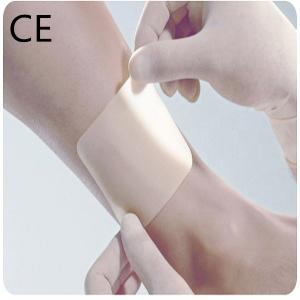

Add to Cart
Medical Ultra-Thin Promote Soft Yellow Hydrocolloid Wound Dressing
Overview:
Medical Hydrocolloid wound dressing is a material containing gel-form agents, such as carboxymethycellulose(CMC and gelatin. It is applied to
wound management, support wound bed a moist environments, accelerate wound healing process. The most common gel in dressings is hydroxymethyl cellulose, which can be firmly adhered to the skin around the wound, and swells up to 12 times after absorbing the exudate.
Specificaiton:
Product Name | Hydrocolloid found dressing |
Product Type | hydrocolloid dressing |
Condition | Pressure Ulcer, Skin Care, Wound Care |
Department | Cardiovascular, Emergency, Intensive Care Unit, Medical-Surgical, Oncology, Operating Room-Surgery, Urgent Care, Wound Care |
Pressure Ulcer Condition Type | Stage2, Stage 3 |
Skin Care Condition Type | Moisture-Associated Skin Damage |
Wound Care Condition Type | Venous ulcers,Ⅰ-Ⅱ bedsore, Superficial and minor burn wounds, Post-op Wound management, Donor Skin Sites, Superficial traum and cosmetology and plastic surgery wound management, Granulation and epithelialization of chronic wound care |
Product Features:
1.Excellent exudates absorption capability.
2.Keep the wound in a moist enviroment, promote wound healing, effectively release pains and reduce frequency of wound care dressing.
3.Waterproof, breathable, protect the wound from microbial invasion.
4.Change the dressing when it turns white.
Product Advantage:
--The hydrocolloid layer absorbs excudate from wound, supplies a moist wound healing environment.
--The outer layer of PU film is waterproof and it can protect the wound from infection.
--Wound-healing accelerated and cost-saving.
--Securely adhesive, soft, comfortable, suitable for different parts of body and easy to use.
--Humanized-design, available in different sizes and styles. Special designs can be made according to customers' requirements.
Application:
Various types of low to moderate exudative wounds, venous lower extremity ulcers, stage I-II bedsores, small-area superficial burns, postoperative wounds, donor site wounds, various superficial traumas and plastic and cosmetic wounds , The granulation and epithelialization phases of chronic wounds.
Instructions:
1.Clean the wound and the surrounding skinwith normal saline;
2.Chose suitable dressing according to the wound size, and the dressing should exceed the wound edge about 1.5-2cm;
3.After the wound and surrounding skin become dry, peel off the release paper and stick the dressings on the wound, then smooth the dressing tenderly;
4.Replacement time is based on the amount of wound exudate, generally, replace it 2 to 3 days later and no more than 7 days.
5.When hydrocolloid dressing absorb exudation to the saturation point, it will be expanded into ivory from light yellow and form a gel, which is a normal situation rather than the wound fester, indicating it should be replaced in time to avoid the skin impregnated
6.Replace it if there is any leakage of exudation.
FAQ:
--Q: Are you trade company or manufacture?
A: We are manufactures who own a 100,000m2 "clean room" factory.
--Q: When can I get the price?
A: We usually quote within 24 hours after we get your inquiry.
--Q: How can I get a sample to check your quality?
A: After price confirmation, you can require for samples to check our quality.
--Q: What about the lead time for mass production?
A: Honestly, it depends on the order quantity and the season you place the order.
Company picture:
